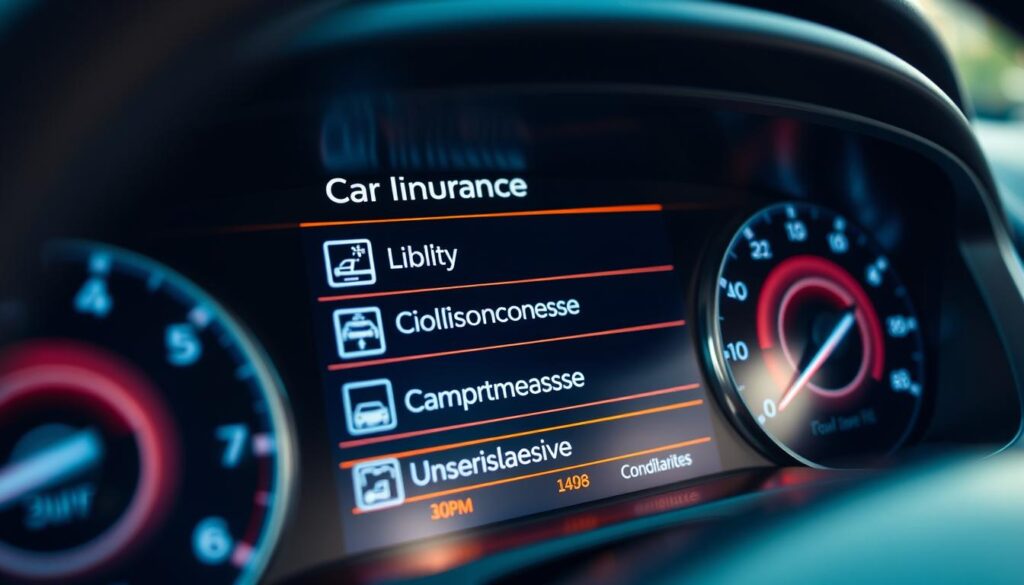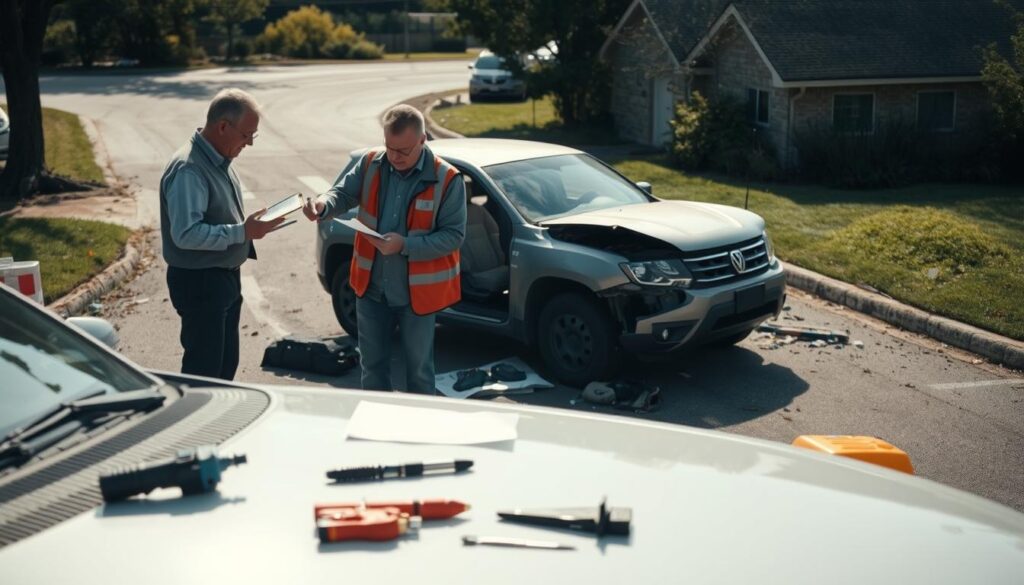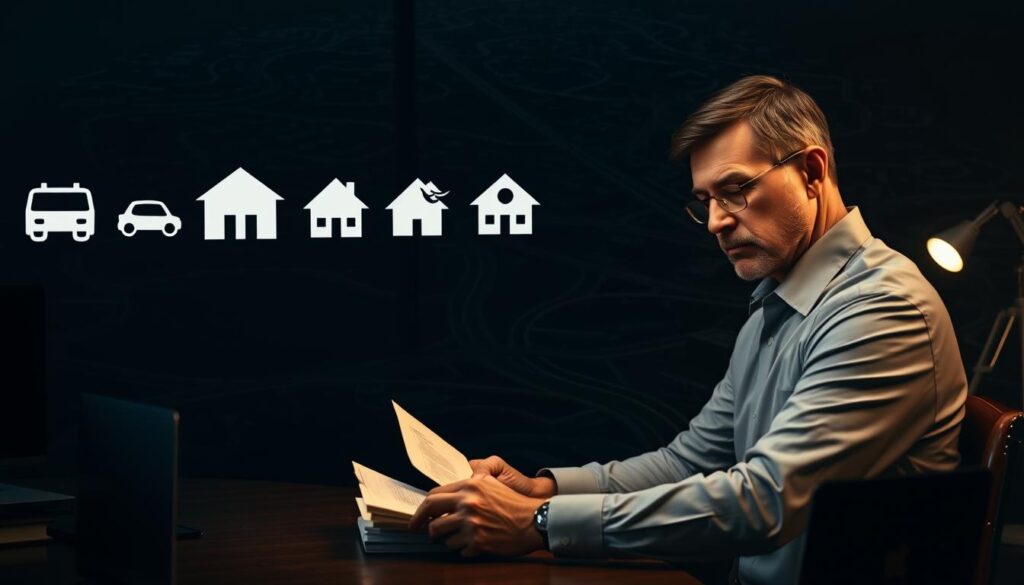Did you know thousands of car insurance claims are filed each year for accidents on private property? It’s important to know what your car insurance coverage includes. This can greatly affect your finances if you’re in an accident.
Just like how unexpected medical bills can be a financial burden, a car accident on private property can be costly. It can also lead to legal problems if you’re not covered properly.
Understanding your car insurance policy can help avoid unexpected costs. It’s key to review your policy. This way, you’ll know what’s covered and what’s not, including private property accidents.
Key Takeaways
- Review your car insurance policy to understand what is covered.
- Know the specifics of your coverage for accidents on private property.
- Understand the financial implications of being underinsured.
- Consider the impact of other insurance-related health issues.
- Be prepared for unexpected expenses related to car accidents.
Understanding Car Insurance and Private Property Claims
Accidents on private property can be as expensive as those on public roads. It’s important to know how your car insurance works. Filing a claim after an accident on private property can be tricky.
How Insurance Companies Define “Private Property”
Insurance companies say “private property” is any place not owned or cared for by the public. This includes private roads, parking lots, and driveways. Knowing this helps you deal with claims better.
A parking lot in a shopping center is private property. Accidents there are handled differently than on public highways.
Differences Between Public and Private Property Claims
The big difference is in jurisdiction and liability. Public property accidents involve government and follow certain rules. Private property claims usually deal with the owner’s insurance.
For example, an accident on a private road might fall on the property owner’s insurance. This is unlike public roads, where state laws apply.
Does Car Insurance Cover Accidents on Private Property?
Car accidents on private property need clear insurance coverage understanding. Insurance policies aim to protect you financially in accidents. Yet, coverage specifics vary by policy type and accident location.
To see if your insurance covers private property accidents, look at your policy’s parts. Car insurance policies have liability, collision, and comp coverage. Each part serves a different purpose.
Liability Coverage on Private Property
Liability coverage is key in your car insurance. It pays for damages to others if you’re at fault. On private property, it works like on public roads. If you damage someone else’s property, like a fence, your liability can help pay.
For example, hitting a neighbor’s mailbox while backing out can be covered. Make sure your policy limits are enough.
Collision Coverage on Private Property
Collision coverage is also important. It covers your vehicle’s damages in accidents, no matter who’s at fault. This includes accidents on private property, like hitting a garage door.
For instance, hitting another car in a parking lot is covered. Remember, collision coverage has a deductible. This is the amount you pay before insurance helps.
Comprehensive Coverage and Private Property Incidents
Comprehensive coverage protects against non-collision incidents, like theft or natural disasters. If your car is damaged on private property by one of these, it can help pay for repairs.
For example, if a tree falls on your car in your driveway, it’s covered. Knowing what’s covered by your comp coverage is key to being protected.
| Type of Coverage | Description | Example on Private Property |
|---|---|---|
| Liability Coverage | Covers damages to others if you’re at fault | Damaging a neighbor’s fence while backing out of a driveway |
| Collision Coverage | Pays for damages to your vehicle in an accident | Crashing into a garage door or another vehicle in a parking lot |
| Comprehensive Coverage | Protects against non-collision incidents like theft or vandalism | A tree branch falling on your car while parked in your driveway |

Knowing about car insurance coverage for private property accidents is important. Review your policy and talk to your insurance provider. This ensures you have the right coverage for your needs.
Common Types of Private Property Accidents
Private property accidents can happen in many ways. Knowing about them helps drivers stay ready and deal with insurance claims better. Accidents often occur in parking lots, driveways, and private roads.

Parking Lot Incidents
Parking lots are accident-prone areas. Backing out collisions are common due to drivers not checking their surroundings well. Also, narrow parking spaces can cause scrapes and dings, mainly in busy lots.
To stay safe, drive carefully in parking lots. Use parking aids if your car has them.
Driveway Accidents
Driveway accidents often happen when drivers reverse into objects or other cars. Big vehicles like SUVs or trucks can make it hard to see. Also, pedestrians, pets, or children in the driveway raise the risk of accidents.
Stay alert and use safety features like rearview cameras to lower the chance of driveway accidents.
Private Road Collisions
Private roads, found in homes or rural areas, can have accidents. This is because of limited visibility or lack of traffic control measures. Drivers might think private roads are safer than public roads.
But, without traffic signals or signs, drivers need to be very careful. They should slow down and be ready for anything unexpected.
Knowing about these common accidents can make you more aware and prepared. This can help lower your risk of being in an accident. It also makes handling insurance claims easier if you do have an accident.
Determining Fault in Private Property Accidents
Knowing how fault is figured out in private property accidents is key to your insurance experience. If you’re in an accident on private land, figuring out who’s at fault is important. It affects your insurance claim and any legal steps you might take.
Fault Determination Process
The process of figuring out fault in private property accidents involves looking at the accident’s details. Insurance adjusters and sometimes cops will check to see who caused the accident. They look at things like witness statements, video, and the property’s layout.
Key factors in fault determination include:
- Reviewing any available video surveillance
- Assessing witness statements
- Examining the accident scene and property layout
- Reviewing statements from those involved
No-Fault States vs. Fault States
No-fault states and fault states have different rules for handling insurance claims after an accident. In no-fault states, you file a claim with your own insurance, no matter who was at fault. In fault states, you need to figure out who was at fault to assign blame for damages.
| Characteristics | No-Fault States | Fault States |
|---|---|---|
| Claim Filing | File with your own insurance | File against the at-fault party’s insurance |
| Legal Action | Limited ability to sue | Can sue the at-fault party |
| Fault Determination | Not necessary for claims | Crucial for determining liability |

It’s important to know these differences after a private property accident. Whether you live in a no-fault or fault state, knowing about fault determination helps with your insurance claims.
Steps to Take After an Accident on Private Property
If you’re in an accident on private property, knowing what to do first is key. The steps you take right after can greatly affect your insurance claim’s success.
Documenting the Accident Scene
It’s important to document the accident scene. Take pictures or videos of the damage to vehicles or property. Also, note the location, time, and any environmental factors that might have caused the accident. This info is very helpful when you file your insurance claim.
Reporting to Insurance Companies
It’s vital to report the accident to your insurance company quickly. Share the photos, witness statements, and any other important details you have. Reporting early helps set the facts straight and speeds up your claim.
“The sooner you report the accident, the better equipped your insurance company will be to handle your claim efficiently.”
Working with the Property Owner
Often, you’ll need to work with the property owner to fix the issue. Be helpful and give them all the info they ask for. If the owner is hard to work with, your insurance can help. Keeping a record of your talks with the owner is also useful.
“Cooperation between the parties involved can significantly simplify the process of resolving the claim.”
Common Insurance Coverage Gaps for Private Property Accidents
Many drivers think their car insurance covers accidents anywhere. But, private property incidents often show big insurance coverage gaps. It’s key to know these gaps to make sure you’re well-protected.
Accidents on private property can cost a lot. If your insurance isn’t enough, you might have to pay out of pocket.
Minimum Coverage Limitations
One big coverage gap is from minimum coverage limits. Many states require a minimum amount of insurance. But, this might not cover all the costs of an accident.
If damages from a private property accident are more than your policy, you’ll have to pay the extra. This is why minimum coverage limitations can put you at risk financially.
| State | Minimum Liability Coverage | Potential Costs Exceeding Minimums |
|---|---|---|
| California | $15,000 per person, $30,000 per accident | High |
| New York | $25,000 per person, $50,000 per accident | Medium |
| Texas | $30,000 per person, $60,000 per accident | Low |
Policy Exclusions to Be Aware Of
It’s also important to know about policy exclusions. Insurance policies often don’t cover certain incidents or damages. This can really affect your coverage.
For example, some policies might not cover accidents with off-road vehicles. Or, they might not cover incidents during racing or other competitive events. Knowing these exclusions is important to avoid surprises when you file a claim.

By knowing about these insurance coverage gaps, you can take steps to protect yourself better. Review your policy and think about getting more coverage. This can help reduce the financial risks of accidents on private property.
Special Considerations for Different Types of Private Properties
Different private properties face unique challenges with car accidents and insurance. The property’s specifics greatly affect insurance claims handling.
Shopping Centers and Business Parking Lots
Shopping centers and business parking lots are busy and risky. Accidents here often involve many parties, like shoppers, employees, and delivery trucks. Claims for these accidents might need extra details, like security footage or witness statements.
It’s key to tell the property management or security about the accident. This ensures there’s a record of it.
Residential Communities and HOAs
Residential areas, managed by HOAs, have their own rules. Accidents here might happen on narrow streets or with parked cars. Knowing the community’s rules and the HOA’s role is important for insurance.
Rural and Agricultural Properties
Rural and agricultural areas are different from cities or suburbs. They might have private roads, big equipment, and animals. This can lead to unique accident situations. Insurance claims for these places must consider these special hazards.
| Property Type | Common Hazards | Insurance Considerations |
|---|---|---|
| Shopping Centers | High traffic, multiple vehicles | Security footage, witness statements |
| Residential Communities | Narrow streets, parked vehicles | Community rules, HOA involvement |
| Rural/Agricultural Properties | Private roads, large equipment, livestock | Agricultural hazards, property-specific risks |
Knowing these differences helps with insurance claims for accidents on private property. By understanding each property type’s unique aspects, you can prepare for the unexpected better.
How to Enhance Your Coverage for Private Property Accidents
Getting more car insurance for accidents on private property can protect your money. Accidents in places like parking lots or driveways can be tricky to deal with. Having the right coverage can really help you recover.
Additional Coverage Options
Think about adding special riders or options to your policy. Some companies offer extra coverage for accidents on private property. This includes:
- Collision coverage with a lower deductible
- Comprehensive coverage for incidents not involving collisions
- Roadside assistance for emergencies on private property
Talking to your insurance provider about these options can make your policy fit your needs better.
Umbrella Policies and Their Benefits
An umbrella policy gives you extra liability coverage beyond your standard policy. It’s great for accidents on private property that cause a lot of damage or injuries. The perks of an umbrella policy are:
| Benefit | Description |
|---|---|
| Additional Liability Coverage | Protects your assets in case of a lawsuit |
| Broader Protection | Covers a wider range of incidents, including those on private property |
| Financial Security | Ensures you’re not left with significant out-of-pocket expenses |
Conclusion: Ensuring You’re Protected Wherever You Drive
Car insurance for accidents on private property is key for your financial safety. Knowing your policy well and the differences between public and private claims is important. It helps you deal with complex situations.
Having good car insurance protection is essential for driving safety. It protects you from financial loss in accidents and gives you peace of mind. The insurance coverage importance is huge. It prepares you for unexpected events on private places like parking lots or driveways.
To boost your car insurance protection, check your policy. Make sure it has full coverage, liability, and collision. You might also consider extra coverage or umbrella policies for more safety.
Being informed and active helps you stay safe wherever you drive. This knowledge lets you use your car insurance wisely and drive confidently.
FAQ
Does my car insurance cover accidents on private property?
Yes, your car insurance usually covers accidents on private property. But, how much coverage you get depends on your policy. This includes liability, collision, and other types of coverage.
How do insurance companies define “private property”?
Insurance companies say private property is land not owned by the government. This includes places like parking lots, driveways, and private roads.
What are the differences between public and private property claims?
Claims on public property involve the government. They have their own rules and deadlines. Claims on private property are between your insurance and the property owner’s insurance.
What should I do after an accident on private property?
First, document the accident scene. Then, tell your insurance company about it. If needed, work with the property owner to fix any problems.
How is fault determined in private property accidents?
Fault is decided based on the accident’s details. This can change based on whether you live in a no-fault or fault state.
Are there any common insurance coverage gaps for private property accidents?
Yes, some common gaps are minimum coverage limits and policy exclusions. These can leave you without enough insurance if you’re not careful.
Can I enhance my car insurance coverage for private property accidents?
Yes, you can get more coverage. Look into extra options and umbrella policies. They can give you more financial protection in case of an accident.
Are there special considerations for different types of private properties?
Yes, different properties like shopping centers or rural areas have their own needs. These can affect your insurance claim.
How does my car insurance policy handle accidents in parking lots or driveways?
Your policy usually covers accidents in parking lots or driveways. This is under collision or other coverage, depending on the accident.
What is the role of liability coverage in private property accidents?
Liability coverage pays for damages to others if you’re at fault. It covers things like property damage or medical bills.
How does my car insurance policy handle accidents in parking lots or driveways?
Your policy usually covers accidents in parking lots or driveways. This is under collision or other coverage, depending on the accident.
How does my car insurance policy handle accidents in parking lots or driveways?
Your policy usually covers accidents in parking lots or driveways. This is under collision or other coverage, depending on the accident.
How does my car insurance policy handle accidents in parking lots or driveways?
Your policy usually covers accidents in parking lots or driveways. This is under collision or other coverage, depending on the accident.
How does my car insurance policy handle accidents in parking lots or driveways?
Your policy usually covers accidents in parking lots or driveways. This is under collision or other coverage, depending on the accident.
How does my car insurance policy handle accidents in parking lots or driveways?
Your policy usually covers accidents in parking lots or driveways. This is under collision or other coverage, depending on the accident.
